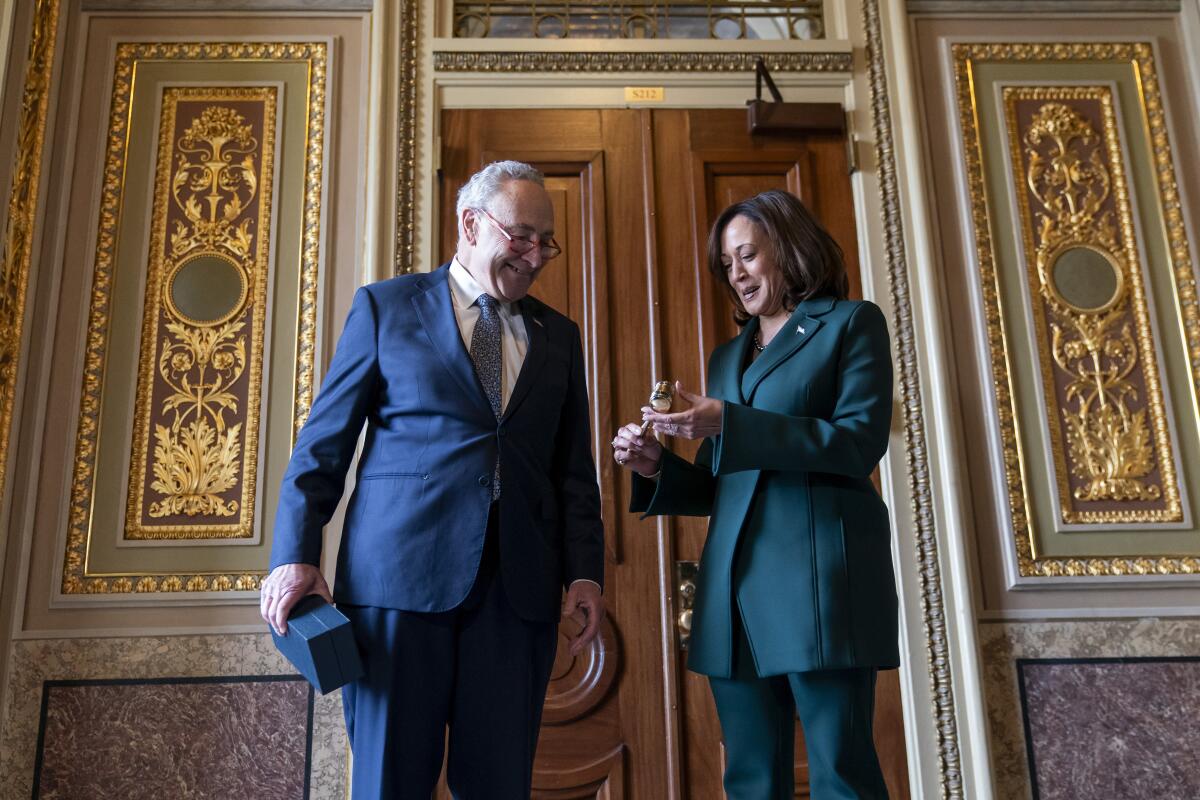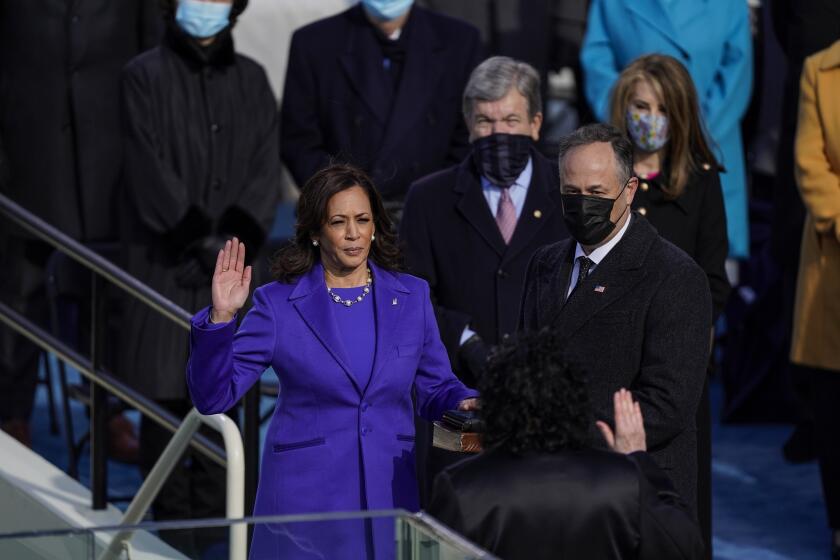Kamala Harris, the first Black woman in her role, just broke a record held by an outspoken slaveholder

- Share via
WASHINGTON — Vice President Kamala Harris set a new record Tuesday that underscored the closely divided nature of modern politics, casting her 32nd tiebreaking vote in the Senate, the most in the chamber’s history.
The vote advanced the nomination of Judge Loren AliKhan to the U.S. District Court in Washington.
Harris takes the tiebreaking record by surpassing John C. Calhoun, who served from 1825 to 1832 under Presidents John Quincy Adams and Andrew Jackson, when the Senate was less than half its current size. Calhoun was among the fiercest defenders of slavery of his era.
“So glad she has exceeded him,” said Donna Brazile, a Harris ally and former leader of the Democratic National Committee.
As a 50-50 tiebreaker, the vice president will have a chance to raise her profile and show loyalty to Biden.
Harris has suffered from low poll numbers and has failed to excite Democratic activists who had hoped she would lead her party’s next generation once President Biden, now 81, leaves the political stage.
But regardless of what happens with her future career, she is now assured multiple places in American history books. Not only is she tops in tiebreakers, but she is also the first woman, the first Black woman and the first Indian American person to serve in nationally elected office. Her husband, Douglas Emhoff, is the first Jewish person in a first or second family and the first man to serve as second gentleman.
Ron DeSantis made his name on culture war issues. But the new presidential candidate’s healthcare record includes running one of the least-insured states in America.
Joel Goldstein, a law professor who has written extensively on vice presidential history, noted that Calhoun and others who held the office in earlier years spent most of their time presiding over the Senate, something modern vice presidents do only when needed to break ties or to bring attention to important votes.
“It is even more symbolic that the first woman ever elected to national office and the first Black to serve as vice president, who has devoted much of her vice-presidential energies to making America more inclusive for traditionally marginalized groups, would pass a record of John C. Calhoun, a slave owner and a leading proponent of slavery and white supremacy,” he said.
After Harris gaveled out the vote, Sen. Majority Leader Charles E. Schumer of New York paused briefly to acknowledge the “historic” day.
“Every time duty has called, Vice President Harris has answered, more than any other vice president in our nation’s long and storied history,” Schumer said.
Harris chose not to speak from the podium and left the chamber shortly after casting her vote. Outside the chamber, Schumer presented her with a golden gavel.
Harris’ ability to break so many ties is in many respects an accident of history, the result of Democrats’ extremely narrow hold on the Senate.
The Senate was tied 50-50 during Harris’ first two years in office, with Harris giving Democrats the majority that allowed them to run committees and set the agenda. Democrats gained a seat in the 2022 midterm elections, giving the party a small cushion and slowing the pace of Harris’ tiebreaking.
Three senators — Kyrsten Sinema of Arizona, Angus King of Maine and Bernie Sanders of Vermont — are independents who caucus with Democrats.
Partisanship in the Senate has been at a modern high for more than a decade. The minority party votes as a unified bloc, and in opposition to routine matters, more often than in earlier eras. Many of Harris’ votes have been to break procedural ties or to advance Biden’s nominees for administration posts that might have been filled with bipartisan support in earlier days.
A return to in-person work might seem like a good thing. But some red-state leaders worry the return-to-work economy will limit their talent pool.
Still, Harris’ ability to break ties has been important for her party’s legislative agenda. She cast deciding votes to advance the $1.9-trillion stimulus bill known as the American Rescue Plan in 2021 and the $700-billion Inflation Reduction Act, Biden’s signature climate bill.
The role has put a spotlight on Harris but it has also limited her ability to travel, since she has sometimes needed to stay near Washington in case the Senate gets knotted up. Presiding over the Senate and casting tiebreaking votes are among the few roles vice presidents are given in the Constitution, giving only partial shape to a job that Harris and many of her predecessors have struggled to define.
Harris’ aides note that her unique status ensures that she is making history with almost every act in office, whether visiting world leaders or making speeches. In May, for example, she became the first woman to give the commencement address at West Point, an honor routinely given to presidents, vice presidents and military leaders who have until now all been male.
Despite their routine nature, a White House official said Harris is eager to use such moments to spotlight the administration’s agenda, including moments when she has presided over losing votes to advance abortion rights and voting rights bills.
More to Read
Get the L.A. Times Politics newsletter
Deeply reported insights into legislation, politics and policy from Sacramento, Washington and beyond. In your inbox twice per week.
You may occasionally receive promotional content from the Los Angeles Times.














